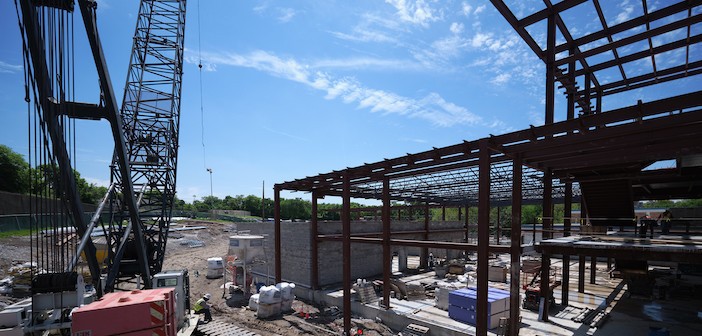New and more efficient security technology, 14 new replacement school buildings, 10 new facilities, renovated natatoriums and school-community hubs were among the highlights of an update to the proposed 2020 bond program presented to the Dallas ISD Board of Trustees in June.
The presentation reflected recommendations from trustees at their February meeting, comments and input from the 100-plus-member Citizens Bond Steering Committee and participants at three virtual community meetings held in May. The updated plan detailed the addition of $20 million for technology improvements to enhance internet connectivity for students and teachers working from locations other than schools. A total of $270 million is allocated for technology throughout the district.
Referring to trustees’ February recommendations, committee co-chair Craig Reynolds said, “We took it to heart and went back to the drawing table.”
New schools and renovations
More than $1.9 billion in the proposed bond package is dedicated to renovating aging facilities and addressing infrastructure and architecture improvements. More than $1.1 billion is allocated for new and replacement campuses.
“This plan will truly bring schools up to a level that we envision in Dallas ISD,” said Deputy Superintendent Scott Layne.
Based on board recommendations, the citizens bond steering committee updated the plan to designate $537 million to replace 14 aging schools.
As part of long-range plan to enhance educational opportunities, the Bond 2020 proposal also includes more than $607 million for 10 new facilities, including:
- a pre-K-12 campus downtown and another in midtown
- a pre-K-eight STEM campus in the medical district
- a pre-K-eight Montessori school in Pleasant Grove
- a transformation school
- a districtwide performing arts center
- four career institutes
Safety and security
New campus security cameras will be equipped with motion sensors that provide real-time alerts, and additional cameras will replace obsolete systems at all schools.
Keyless exterior doors accessible by key card will provide a safer, more secure school environment for students and staff.
A new weapons detection system will replace metal detectors at all middle and high schools. Similar to those at airports, hat the proposed system uses a safe scanner to detect weapons.
According to Deputy Chief of Operations Sherry West-Christian, the system will maintain safety and speed the process of admitting students and visitors into buildings. Checking for weapons using metal detectors can cause delays when alerts require people to pass through the detector several times. With the new system, weapons will be more easily detectible so that persons carrying anything that requires a second look can be taken aside while others are admitted.
Athletic facilities
In February, trustees recommended the committee consider needed renovations to the district’s pool facilities. The current proposal has $33.5 million for repair and maintenance of existing natatoriums, including facilities at Alamo, Lisbon, Loos, Pleasant Grove, Sprague and White Rock.
The bond proposal also sets aside $29 million to replace grass with athletic field turf at all high school practice fields, this to extend the durability and create multi-functional use in terms of athletics, fine arts, and academics. Athletic field turf is also more cost- effective long term by helping the district to reduce maintenance and utility costs.
Racial equity
The Bond 2020 proposal includes $41.3 million to build four school-community hubs in the Lincoln, H. Grady Spruce, L.G. Pinkston, and Franklin D. Roosevelt high school communities. The locations were identified by assessing area needs with a Community Resource Index (CRI). The tool helps to identify neighborhoods where public investment can provide needed support for students and their families.
The hubs will provide access to resources in partnership with entities such as Parkland Hospital System, Dallas Housing Authority and others depending on what residents of each community identify as priorities. The Racial Equity Office is holding virtual community conversations through October to determine these priorities.
Layne said the $3.7 billion bond proposal includes funds for several other initiatives, such as joint participation with other governmental entities, green building fund, and updated classroom furniture throughout the district.
For more details, click here to see the June 11 presentation to the Board of Trustees

